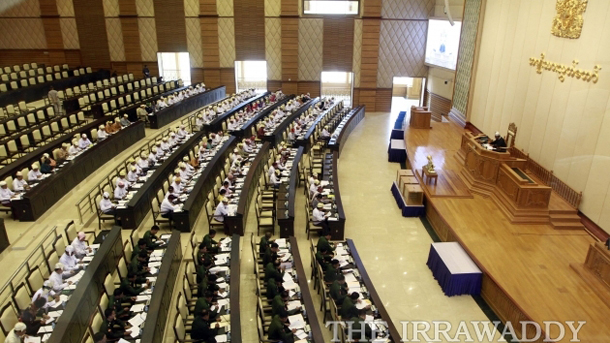RANGOON — Burma’s Upper House of Parliament passed an amended bill covering interfaith marriages on Wednesday, with lawmakers voting to reduce prison sentences for violators of the law that were proposed by the legislature’s lower chamber.
The Buddhist Women’s Special Marriage Bill, also known as the Interfaith Marriage Bill due to its provisions on marrying outside of one’s faith, is part of a contentious legislative package known as the Protection of Race and Religion Bills that was first proposed by the Buddhist nationalist group Ma Ba Tha.
Lawmakers on Wednesday voted in line with changes to a Lower House bill that were recommended by the Upper House Bill Committee and cut the maximum prison sentence for violators of multiple provisions from five years to two.
In addition to the two year prison term, the Upper House bill sets a maximum fine of 1.5 million kyats (US$1,500) for any non-Buddhist man who is found to have insulted his Buddhist wife’s faith, prevented his wife from having a Buddhist funeral, and destroyed or damaged his wife’s sacred objects or place of worship.
Any non-Buddhist man who is found to have persuaded his Buddhist wife to abandon her faith would be subject to a fine not exceeding 2 million kyats under the bill passed by the Upper House, and sentenced to no more than two years in prison.
The Upper House voted to increase the maximum fine for violations of articles pertaining to the duties of township administrators, who are designated as marriage registration officers in the bill and are responsible for the Interfaith Marriage Bill’s bureaucratic burden. Those tasks include publically posting notification of an interfaith couple’s intent to marry, informing parents of the Buddhist woman if she is under 20 years old and fielding objections to any such matrimony.
The maximum prison sentence for marriage administrators who fail to follow the letter of the law was unchanged from the Lower House bill at six months, while fines rose from 50,000 kyats to 200,000 kyats.
The Interfaith Marriage Bill was approved by Burma’s Lower House of Parliament on March 19 and sent to Upper House lawmakers. The upper chamber’s Bill Committee recommended the changes passed on Wednesday, in addition to other minor revisions.
The legislation now returns to the Lower House, which can offer its own amendments or pass the bill as is.
The Interfaith Marriage Bill, which has come under harsh criticism from women’s rights advocates and members of the international community, does still require Buddhist women to seek permission from local authorities before marrying a man of another faith.
Another piece of legislation that was part of the Protection of Race and Religion Bills was signed into law by President Thein Sein last week. That law allows local authorities in certain circumstances to impose a birth-spacing order limiting women to only one child every three years, though the legislation does not appear to include punitive penalties for violating the restriction.
The Race and Religion Protection package includes two other bills that Parliament is expected to put to votes, one covering religious conversions and the other banning polygamy.

















